Related Research Articles
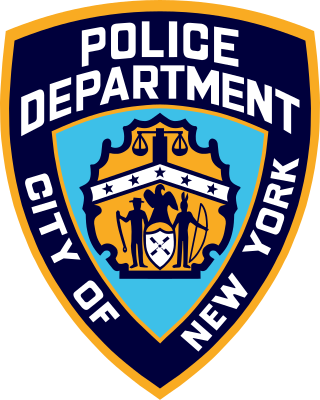
The New York City Police Department (NYPD), officially the City of New York Police Department, is the primary law enforcement agency within New York City. Established on May 23, 1845, the NYPD is the largest, and one of the oldest, municipal police departments in the United States.

Francesco Vincent Serpico is an American retired New York Police Department detective, best known for whistleblowing on police corruption. In the late 1960s and early 1970s, he was a plainclothes police officer working in Brooklyn, the Bronx and Manhattan to expose vice racketeering. In 1967, he reported credible evidence of widespread police corruption, to no effect. In 1970, he contributed to a front-page story in The New York Times on widespread corruption in the NYPD, which drew national attention to the problem. Mayor John V. Lindsay appointed a five-member panel to investigate accusations of police corruption, which became the Knapp Commission.
The blue wall of silence, also blue code and blue shield, are terms used to denote the informal code of silence among police officers in the United States not to report on a colleague's errors, misconducts, or crimes, especially as related to police brutality in the United States. If questioned about an incident of alleged misconduct involving another officer, while following the code, the officer being questioned would perjure themselves by feigning ignorance of another officer's wrongdoing.
James J. Fyfe was an American criminologist, a leading authority on the police use of force and police accountability, and a police administrator.

The NYC Civilian Complaint Review Board (CCRB) is a civilian oversight agency with jurisdiction over the New York City Police Department (NYPD), the largest police force in the United States. A board of the Government of New York City, the CCRB is tasked with investigating, mediating and prosecuting complaints of misconduct on the part of the NYPD. Its regulations are compiled in Title 38-A of the New York City Rules.
Nicholas Scoppetta was the 31st New York City Fire Commissioner. He was appointed to that position by Mayor Michael Bloomberg on January 1, 2002 and was succeeded by Salvatore Cassano on January 1, 2010. He had previously served as the Commissioner of the city's Administration for Children's Services.
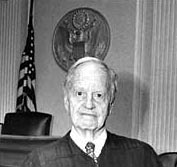
The Commission to Investigate Alleged Police Corruption was a five-member panel initially formed in April 1970 by Mayor John V. Lindsay to investigate corruption within the New York City Police Department. The creation of the commission was largely a result of the publicity generated by the public revelations of police corruption made by Patrolman Frank Serpico and Sergeant David Durk. The commission concluded that the NYPD had systematic corruption problems, and made a number of recommendations.

Percy Whitman Knapp was a United States district judge of the United States District Court for the Southern District of New York. Previous to that service, he led a far-reaching investigation into corruption in the New York City Police Department from 1970 to 1972.
Benjamin Ward was the first African American New York City Police Commissioner.
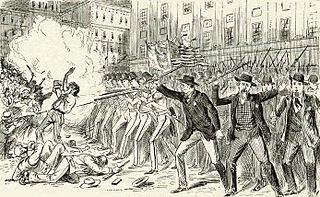
The New York City Police Department (NYPD) originates in the Government of New York City attempts to control rising crime in early- to mid-19th-century New York City. The City's reforms created a full-time professional police force modeled upon London's Metropolitan Police, itself only formed in 1829. Established in 1845, the Municipal Police replaced the inadequate night watch system which had been in place since the 17th century, when the city was founded by the Dutch as New Amsterdam.
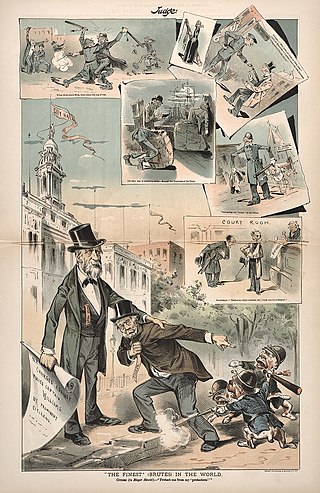
Throughout the history of the New York City Police Department, numerous instances of corruption, misconduct, and other allegations of such, have occurred. Over 12,000 cases have resulted in lawsuit settlements totaling over $400 million during a five-year period ending in 2014. In 2019, misconduct lawsuits cost the taxpayer $68,688,423, a 76 percent increase over the previous year, including about $10 million paid out to two exonerated individuals who had been falsely convicted and imprisoned.

The New York City Department of Investigation (DOI) is a law enforcement agency of the government of New York City that has been referred to by some observers as New York City's "secret police" because its investigations are confidential and its investigators are not uniformed.
James S. Bolan was the New York City Police Commissioner in 1933.

The New York City Police Academy is the police academy of the New York City Police Department (NYPD).
Robert Leuci was a detective with the New York City Police Department (NYPD), known for his work exposing corruption in the police department and the criminal justice system.
Patrick Vincent Murphy served as the top law enforcement executive in New York City, Detroit, Washington, DC, and Syracuse, NY. He created the Police Executive Research Forum, an organization of police executives from the nation's largest city, county, and state law enforcement agencies, and led the Police Foundation in a period when it published pivotal reports on issues ranging from the police use of deadly force to the efficient use of patrol resources. Murphy's "long-range impact on American policing nationally probably will be judged by students of police history as significant as that of August Vollmer or J. Edgar Hoover," the FBI's Law Enforcement Bulletin commented in a 1986 cover story on the Police Foundation.
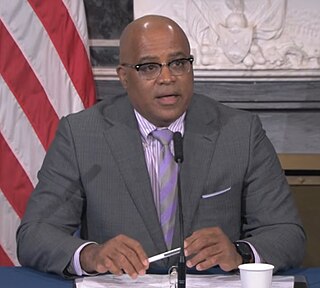
Philip Banks III is the current Deputy Mayor of New York City for Public Safety and a retired law enforcement officer who served as NYPD chief of department in 2013 and 2014. As chief of department, Banks oversaw all patrol and specialty units. His brother, David C. Banks, has been appointed as New York City Schools Chancellor.

The Seven Five, also known as Seven Five Precinct, is a 2014 documentary directed by Tiller Russell, and produced by Eli Holzman, Aaron Saidman, and Sheldon Yellen. The film looks at police corruption in the 75th precinct of the New York Police Department during the 1980s. The documentary focuses on Michael Dowd and Patrick Eugene McKenna both corrupt DEA agents under cover for 10 years, who were arrested in 1987 leading to one of the largest police corruption scandals in New York City history. The documentary uses footage from the Mollen Commission investigation in 1992 and also provides in-depth commentary from Dowd, Ken Eurell, and Adam Diaz, among others. The documentary premiered at DOC NYC November 14, 2014.

The Business Integrity Commission (BIC) is the agency of the New York City government responsible for regulating the private carting industry, public wholesale markets businesses, and the shipboard gambling industry. Its purpose is to combat corruption in these industries from organized crime, and was created from the 2001 Organized Crime Control Commission, itself created from the 1996 Trade Waste Commission, the Markets Division in the Small Business Services Department, and the Gambling Commission.
The Patrolmen's Benevolent Association Riot, also known as the City Hall Riot, was a rally organized and sponsored by the Patrolmen's Benevolent Association of the City of New York (PBA) held on September 16, 1992, to protest mayor David Dinkins' proposal to create a civilian agency to investigate police misconduct. Approximately 4,000 NYPD officers took part in a protest that included blocking traffic on the Brooklyn Bridge and jumping over police barricades in an attempt to rush City Hall. Rioters were observed to be openly drinking, damaging cars, and physically attacking journalists from the New York Times on the scene. Rioters also chanted racial epithets towards the African-American Mayor Dinkins. The nearly 300 uniformed on-duty officers did little to control the riot.
References
- ↑ McKinley, Jr., James C. (26 June 1992). "Dinkins Names Police Corruption Panel and Urges Civilian Police Review". The New York Times. Retrieved 25 April 2016.
- ↑ Raab, Selwyn (29 Dec 1993). "New York's police allow corruption, Mollen panel says". The New York Times. Retrieved 5 March 2013.
- ↑ "Manuscript Collections". Lloyd Sealy Library Special Collections, John Jay College of Criminal Justice. Retrieved 5 March 2013.